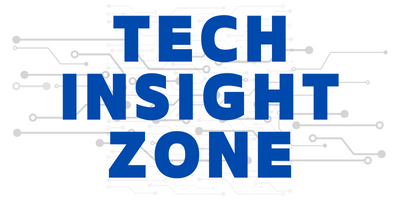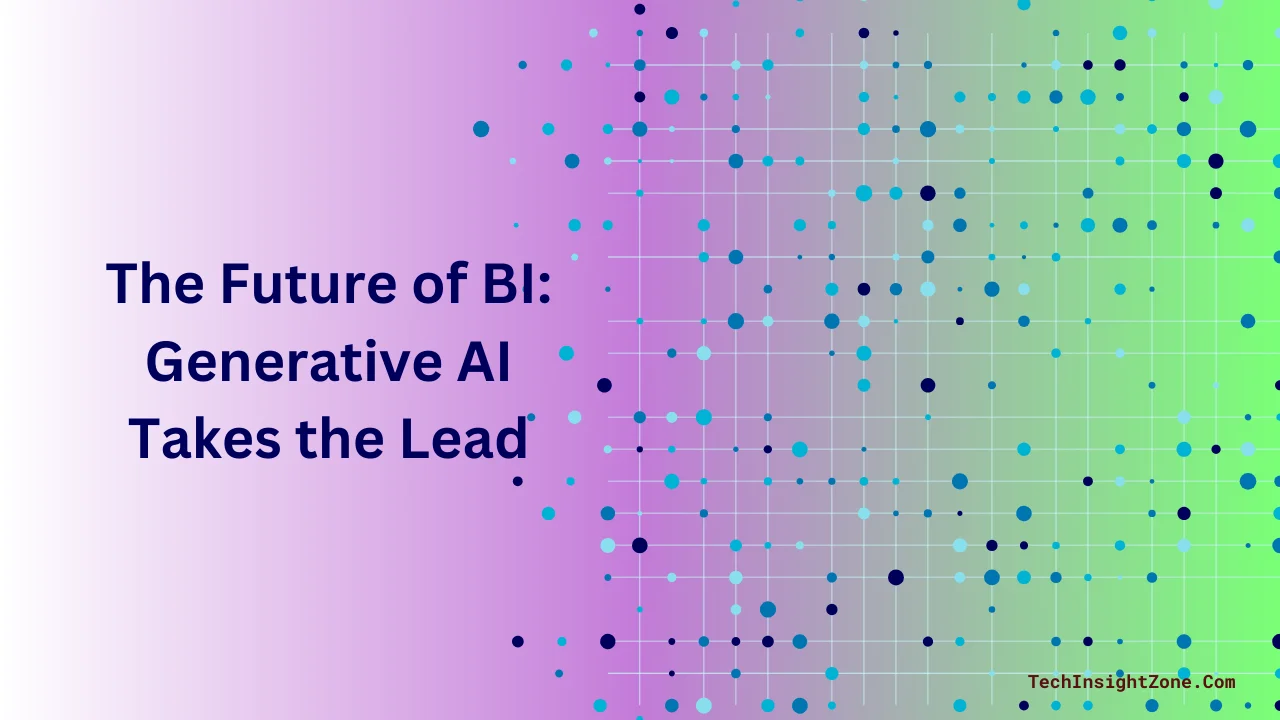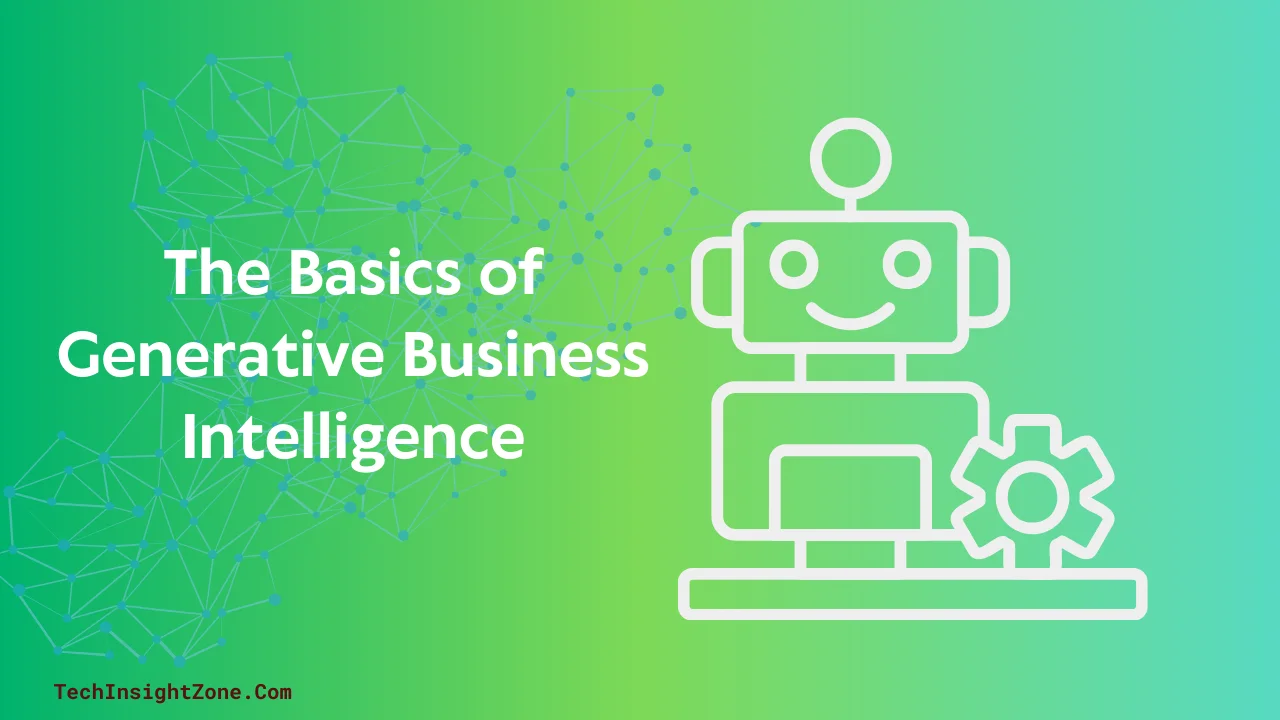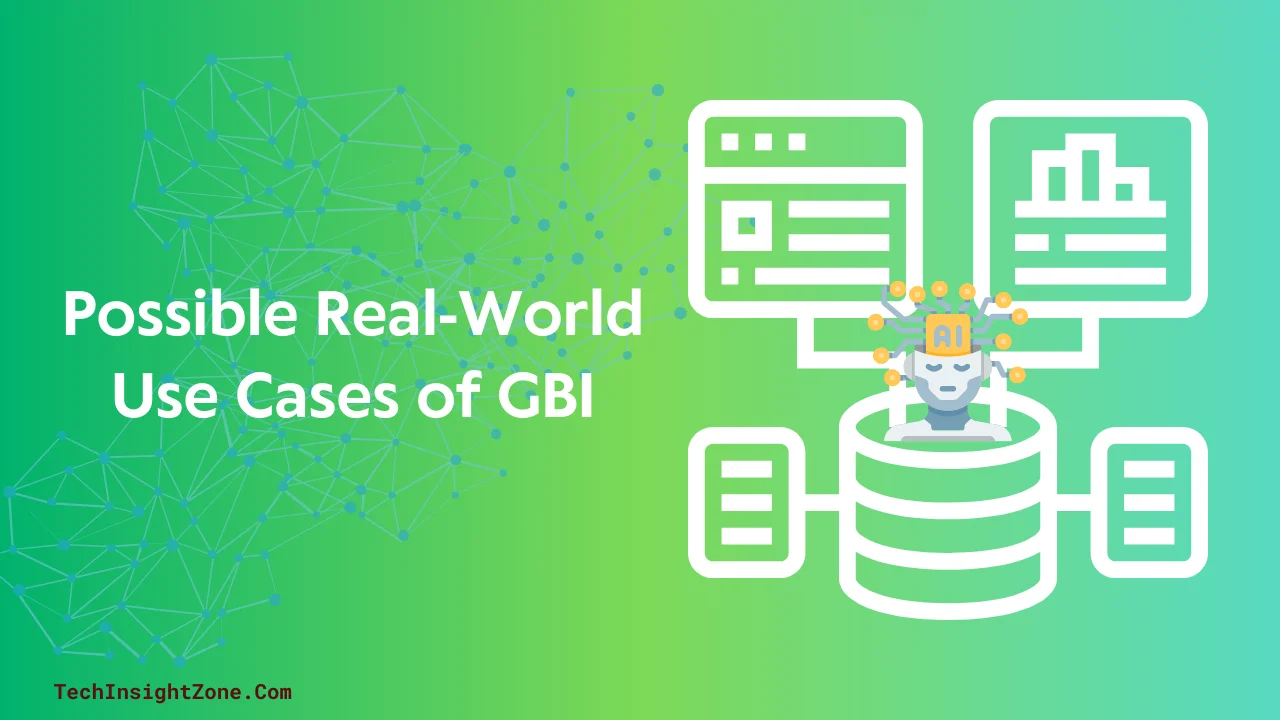Artificial intelligence (AI) has moved beyond its fictional roots and is now an important part of many industries, including business intelligence (BI).
The combination of generative AI and BI—called Generative Business Intelligence (GBI)—is changing how businesses work with data.
This new approach allows companies to better understand their data, respond quickly to insights, and make smarter decisions.
In this discussion, we’ll explore how AI can change the way we look at our data. To understand this change, it’s important to first define what Generative Business Intelligence means.
What Is Generative Business Intelligence? The Basics
Generative Business Intelligence (GBI) is an advanced approach that integrates generative artificial intelligence (AI) technologies into traditional business intelligence (BI) processes.
Key components of GBI include natural language processing (NLP), generative adversarial networks (GANs), and deep learning frameworks.
- NLP allows organizations to analyze and interpret unstructured data, such as customer feedback and social media interactions, providing insights into customer sentiments and preferences.
- GANs enable the generation of synthetic data that can simulate various scenarios, assisting businesses in testing strategies without relying on actual past data.
- Deep learning frameworks enhance GBI by recognizing complex patterns within large datasets, improving the accuracy of predictions and insights.
Unlike conventional BI, which primarily focuses on data collection, analysis, and visualization, GBI enhances these processes by autonomously generating insights and predictions from raw data.
This capability allows organizations to uncover new perspectives and identify previously unnoticed patterns, leading to the discovery of strategic opportunities.
GBI empowers businesses to pose deeper questions, such as “why did a specific trend occur?” and “what’s next?” By addressing these questions, organizations can make more informed, agile decisions that drive growth and innovation.
Understanding these basics sets the stage for examining the profound impact of GBI on the ever-evolving landscape of big data analytics.
The Impact of Generative Business Intelligence on Big Data Analytics
In today’s data-driven world, organizations face the challenge of managing vast amounts of information, often leading to data overload that surpasses the analytical capabilities of traditional business intelligence (BI) systems.
Generative AI serves as a transformative solution, automating the analysis of large datasets and producing insights with remarkable speed and accuracy.
This technology allows businesses to process complex data more efficiently, enabling them to identify trends and anomalies that would be difficult or time-consuming to detect manually.
Generative Business Intelligence (GBI) reduces reliance on human analysts by autonomously predicting outcomes, developing advanced predictive models, and even facilitating automated decision-making processes.
This capability not only accelerates the analysis timeline but also enhances the accuracy of predictions, leading to better-informed business strategies.
However, as GBI is still under development, there are many open source BI tools for your business in the market that may not inherently offer AI functionalities, they serve as flexible and cost-effective options for organizations to manage and visualize their data.
These tools can support businesses in harnessing traditional analytics to make data-driven decisions, thereby maximizing the value of their information.
But the future is bright and just around the corner, as the influence of generative AI continues to reshape data practices in exciting ways. Now, let’s take a look at some of the possibilities.
Unlocking Deeper Insights with Generative Business Intelligence
One of the standout benefits of generative BI is its ability to detect trends and patterns that human analysts might overlook. For instance, AI can analyze customer behaviors, inventory dynamics, and market fluctuations, generating reports that reveal new business opportunities or potential risks.
This forward-looking insight enables organizations to capitalize on emerging trends and navigate challenges proactively.
According to industry experts, such as Kate Wright (Sr. Director, Product- Google), the integration of generative AI in BI allows businesses to move from descriptive analytics to predictive and prescriptive analytics.
This shift helps organizations not just understand what happened in the past but also anticipate future developments and make informed strategic decisions.
By looking at specific applications, we can better illustrate the tangible benefits of generative BI in action.
Possible Real-world Applications of Generative Business Intelligence
The practical applications of generative BI span various industries:
- Healthcare: Generative BI can analyze patient data to predict disease outbreaks or optimize treatment plans, enhancing patient care and operational efficiency. For example, a healthcare provider used generative BI to analyze historical patient data, successfully predicting flu outbreaks and optimizing resource allocation.
- Finance: In finance, GBI can help identify fraudulent activities by analyzing transaction patterns in real time. A leading bank implemented generative BI to detect unusual transaction behaviors, resulting in a 30% decrease in fraud incidents.
- Retail: Retailers can utilize generative BI to forecast demand, manage inventory, and tailor marketing strategies based on customer preferences, leading to improved sales and customer satisfaction. For example, a major retailer used GBI to analyze shopping trends, resulting in a 25% increase in sales during seasonal promotions.
However, the road is not as smooth as it sounds! The technology is still under development. So, we will have to overcome the potential challenges.
Overcoming Challenges and Considerations
While the benefits of generative BI are significant, organizations must also navigate potential challenges. Data quality and integration are paramount; poor data can lead to misleading insights. Ensuring that data is clean and consistent is essential for accurate analysis.
Additionally, the implementation of generative BI requires a cultural shift within organizations, as teams must embrace data-driven decision-making and collaborate across departments. As highlighted by industry experts, ensuring that staff are trained and comfortable with these new tools is essential for successful integration.
Companies should invest in training programs and encourage a culture of continuous learning to fully harness the potential of generative BI. This understanding will help ensure that organizations adopt generative BI responsibly and transparently.
Ethical Considerations
As organizations increasingly rely on generative BI, ethical considerations must be addressed. Issues such as data privacy, algorithmic bias, and transparency in AI decision-making are critical. Organizations should implement ethical AI frameworks that prioritize fairness and accountability, ensuring that their use of generative BI aligns with societal values.
Future-Ready with Generative Business Intelligence
Companies adopting generative business intelligence gain a significant competitive advantage in today’s data-driven marketplace. This technology enhances data analysis and redefines decision-making processes.
Generative AI fosters a proactive approach, shifting the focus from historical data to predictive insights about future trends and strategic imperatives.
As Avi Perez (Founder of Pyramid Analytics) pointed out in recent discussions, the future of BI lies in integrating generative AI with traditional workflows to improve accessibility and trust in AI-generated insights.
As the adoption of generative BI technologies expands, we can expect continuous advancements in BI tools, positioning them as integral components of big data strategies.
For enterprises eager to remain competitive, integrating generative business intelligence is not just an option—it’s becoming a necessity.
Final Words
Generative Business Intelligence is reshaping the landscape of big data analytics. It empowers organizations to uncover hidden insights, automate processes, and enhance operational efficiency.
By fostering collaboration across teams and continuously integrating high-quality business transactions, generative BI equips companies to navigate the complexities of the global market more effectively.
In today’s corporate environment, adaptability and insightful data analysis are crucial. As more businesses turn to open-source BI tools, the synergy between generative AI capabilities and cost efficiency transforms customer relationships and operational frameworks.
Whether aiming to streamline operations, elevate customer experiences, or explore new growth avenues, embracing generative AI within the realm of BI is essential for staying ahead of the competition.






